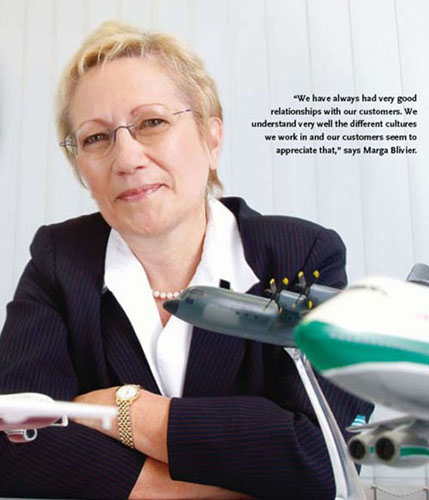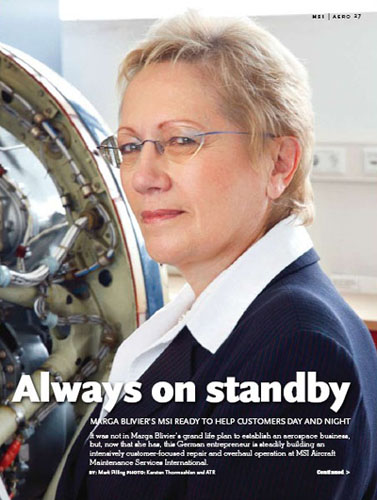|
|
Über Mitglieder des
RRK (2009)
Marga Blivier |
|
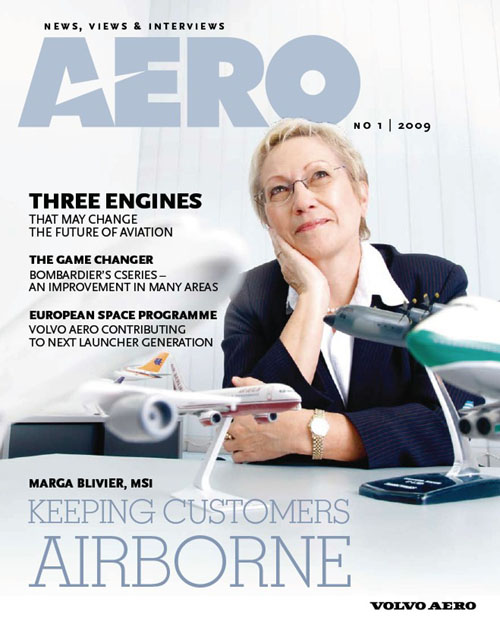
Für die erste Ausgabe des VOLVO AERO Magazins
fotografierte Karsten Thormaehlen die sympathische Unternehmerin Marga Blivier
für eine Cover Story mit dem Titel: “Keeping Customers airborne”.
|
Always on standby
Marga Blivier’s MSI
ready to help customers day and night
By:
Mark Pilling / Photo: Karsten Thormaehlen and ATR (aus "VOLVO
AERO MAGAZINE", 1/09)
It
was not in Marga Blivier’s grand life plan to establish an aerospace business,
but, now that she has, this German entrepreneur is steadily building an
intensively customer-focused repair and overhaul operation at MSI Aircraft
Maintenance Services International.
Marga Blivier
describes her transition from company woman to company owner as a “fantastic
accident”. However, it is hardly an accident that, over the past nearly 20 years,
MSI has carved out a niche in the maintenance, repair and overhaul markets of
Europe, Africa, the Middle East and Asia for a variety of engines, auxiliary
power units (APU), avionics and other equipment.
|
The “win-win” relationship
|
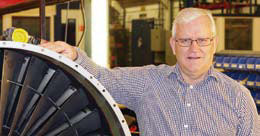
Göran Nordén,
Vice President Marketing & Sales Engine Services, Volvo Aero |
“For Volvo Aero, its relationship with
MSI Aircraft Maintenance Services International is all about reaching places
and providing services we cannot provide so easily ourselves,” explains
Göran Nordén, Vice President Marketing & Sales Engine Services, Volvo Aero.
“MSI is an important customer and partner,
covering regions where we think they are more available to customers than we
are,” says Nordén. For instance, MSI has an extensive network of customers
and contacts across Africa. “We simply don’t have the coverage MSI has in
that part of the world.”
Although the business relationship between
Volvo Aero and MSI began on the TFE731 engine, the main focus today is the
PW100. “This is where we have the most potential together,” says Nordén.
Volvo Aero repairs a significant number of PW100s from this part of the
world that it receives from the MSI arrangement.
Complement to Volvo Aero
MSI acts as an essential complement to Volvo
Aero’s repair and overhaul management representative in Africa and other
selected markets like the Middle East. “MSI helps to give an on-site service
to customers, such as boroscope inspections of engines or troubleshooting,”
says Nordén.
MSI and Volvo Aero work closely to assess the
work scope of any engine. “We have a very good dialogue with MSI and our
customers on what should be done on the engine,” he says. This is especially
important for smaller operators that may not have the in-house technical
expertise.
Improving business in Africa
If the inspections show the engine requires
more extensive work that cannot be performed on site, MSI sends it to Volvo
Aero in Sweden. “We are partners, giving customers a total service package.
Together, we can offer more,” explains Nordén.
“MSI has a strong position in Africa and we
get a large number of engines that would not easily come our way,” he says.
It may be a cliché to say that a business
relationship is a “win-win” situation, but, in the case of MSI and Volvo
Aero, it appears as close as you can get. |
Blivier’s philosophy is
simple, “We are just here for the customer, day and night”.
Individual service
MSI was founded on this
principle and the company is still small enough – it currently employs 43 people
at its headquarters near Frankfurt and its satellite operation in Dubai – to
remain intimate and approachable. “This is our strength,” she explains. “Large
companies are sometimes not that flexible – we can give customers more
individual service.”
MSI’s roots as an
aerospace business date back to 1991 when Blivier teamed up with a one-man
company that was marketing industrial lasers. This product line was immediately
dropped and MSI began concentrating on aviation work. “All my life, I have
worked in the aviation industry, mainly for Garrett and then Honeywell in
Germany,” she says.
Armed with an MBA,
Blivier’s early career saw her working on the repair and overhaul of Garrett
engines, the production of APU components and the contract negotiations in new
APU projects for Airbus jetliners and Eurofighter at Honeywell.
Over time, however, the
changing strategy of the aerospace giant made her realise there could be market
gaps a smaller operation could exploit. “I thought there was perhaps an
opportunity to support small and medium-sized operators if I had my own company.”
Branching out into
business on her own was a risk, but the move out of Honeywell was amicable. “In
the beginning, we had a lot of good co-operation with
Honeywell and we still work together today,” she says.
|
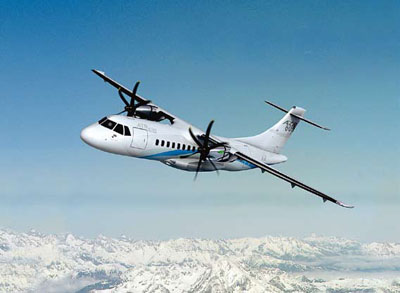
The main focus of the MSI-Volvo Aero
collaboration today is on the PW100 turboprop series – the powerplant of the
Fokker 50, Bombardier Dash 8 family or, as seen here, the ATR-42.
“We cannot compete with Volvo Aero, P&W or
Lufthansa Aero and we don’t want to. We try to find the niche where nobody
wants to or is unable to do the work.”
Marga Blivier,
owner and Managing Director of msi |
From the initial team of
two, MSI started to grow. It hired a handful of experienced aviation engineers
and technicians and began to trade, initially in the repair of APU and engine
components. Blivier was shortly to become the sole owner and managing director
of the company, as MSI grew.
Over the years, the
company has developed the capability to support a wide range of components.
Around 80% of its work is for commercial airlines, with most of the rest in
business aviation and helicopters and a small amount of defence work. Presently,
MSI holds EASA Part 145, FAA Part 145 and GCAA Car 145 approvals.
From APU repairs to
engine service
From its beginnings in
the repair and overhaul of APU and engine components, MSI moved into servicing
the Pratt & Whitney Canada PW100 series of turboprop engines, which power
aircraft like the ATR-42, Fokker 50 and Bombardier Dash 8 family. This work is
carried out at its Rüsselsheim headquarters near Frankfurt Airport. “For several
years, we worked on this engine in co-operation with Lufthansa Aero in Germany,”
says Blivier.
It developed the
capability for hot section inspections and repair, either in the workshop or on
site at the customer and is an EASA Part 145 approved repair facility for the
PW100. Three years ago, it started working with Volvo Aero on the Honeywell
TFE731 turbofan, a popular business jet engine, and then moved into the PW100
turboprop. It also does minor work on the Pratt & Whitney JT8D engine that
powers airliners like the MD-80.
Engine work with Volvo
Aero now makes up approximately twenty per cent of its business, with the bulk
of it now involving the PW100.
Blivier’s relationship
with Volvo Aero dates back to her time with Garrett, when the companies worked
together on servicing the TFE731 engine. It is this kind of experience that
makes her keenly aware of the motivations, benefits and limitations of larger
players. She is careful to work in collaboration with the large engine overhaul
shops, especially in tough markets like the maintenance of PW100s.
Small and
medium-sized customers
“We cannot compete with
Volvo Aero, P&W or Lufthansa Aero and we don’t want to,” she says. “We try to
find the niche where nobody wants to or is unable to do the work. The main thing
is that we don’t want to compete with Volvo Aero – we complement each other.
“Our customers are
mainly not the big ones, but in the small to medium-sized range. Historically,
we have always had very good relationships with our customers. We understand
very well the different cultures we work in and our customers seem to appreciate
that,” she says.
Troubleshooting
around the clock
MSI engineers are on
standby to go anywhere in the world to work on an aircraft with a problem. “We
send our people into the desert in Africa or into Asia,” she says. “Sometimes
pilots call us in the middle of the night with a problem to see if we can
troubleshoot it over the telephone.”
MSI has grown quickly in
the past two years and Blivier wants to continue the upward path, albeit at a
slower rate, as the economic crunch hits the market. She believes there will be
opportunities, especially for companies that can mine good niche markets.
“I’m a very positive
person and I just believe that, if we work hard and give good service, we can
increase our business, even if the economy is not so good any more.” |
|




